Dogs may chew their legs until they bleed due to various underlying causes such as skin allergies, insect bites, fungal infections, anxiety, or pain. Proper diagnosis and treatment by a veterinarian are crucial to address the issue. Solutions may include providing appropriate chew toys, ensuring physical and mental stimulation, using anti-chew sprays, and addressing dietary allergies.
Reasons Why Dogs Chew Their Legs
Dogs sometimes chew their legs, and it can be alarming for dog owners when it becomes a problem. So, why does your dog chew his leg? Let’s take a closer look at some common reasons.
Skin Allergy and Food Sensitivity
Some dogs develop allergies to certain foods or environmental triggers like pollen. These allergies can cause skin irritation and itching, leading the dog to chew and scratch an itch. Your veterinarian may prescribe topical treatments or a new diet to address these issues.
Contact Dermatitis
Contact dermatitis is a skin condition that can inflame the skin. Exposure to irritants like cleaning products can cause this condition and lead to chewing.
Acute Moist Dermatitis (Hot Spots)
Hot spots, or acute moist dermatitis, are inflamed, infected areas that become sore and make dogs lick or chew the spot. Immediate treatment from a veterinarian may be needed.
Insect Bites
Flea, mite, and tick bites are common reasons for dogs to chew their legs. They can cause itchiness, inflammation, and bacterial or fungal infections in the dog’s skin. Treating these parasites is essential to stop the dog from chewing and prevent further complications.
Fungal or Bacterial Infections
Dogs may also develop bacterial or fungal infections that lead to chewing. Pyoderma, a bacterial skin infection, can cause itching and discomfort, leading dogs to chew the infected areas.
Anxiety and Boredom
Dogs require companionship and stimulation to stay happy. If a dog isn’t getting enough exercise or mental stimulation, it may develop compulsive behavior like leg chewing. Anxiety or stress can also be reasons why dogs chew their paws. Dog owners can help by providing more interaction and making sure their dogs are pack animals, engaged with their human family.
Pain or Discomfort
If you notice your dog chewing a leg excessively, it could be due to pain or discomfort from an injury, leading the dog to chew an area of the body until it gets raw and sore. Consulting a vet is crucial in these cases to determine the cause and create a treatment plan.
Always consult with a veterinarian to identify the specific cause for concern in your dog. If your dog is chewing his leg, don’t delay in taking your dog to the vet, as the underlying issue may be more complex.
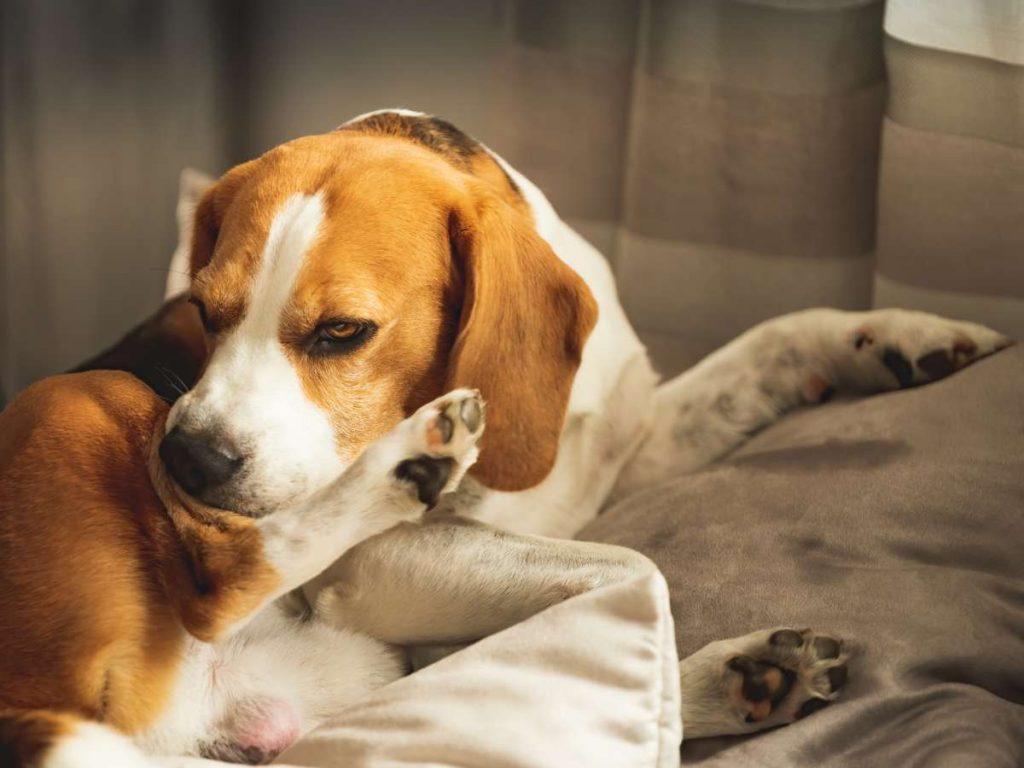
How Dog Owners Can Identify the Cause
When you notice your dog chewing, licking, or scratching his leg, it may be a cause for concern. Knowing why dogs may chew their legs is vital to stop the behavior and keep the dog happy and healthy. Here’s how to identify the cause:
Observe the Dog’s Behavior and Surroundings
Dog owners can play an essential part in identifying why their dog may be chewing its leg. Look for signs of irritation, dry skin, or swelling in the paw pads. Sometimes, common reasons for dogs to chew their legs could be due to environmental factors like pollen or allergens.
If you have recently changed your dog’s diet or notice any changes in their environment, such as new furniture or cleaning products, this could lead to chewing behaviors. Observing and understanding these factors can make it easier to address the problem.
Consult with a Veterinarian
One of the most common and effective ways to find out why a dog is chewing its leg is to consult a veterinarian. The vet may take a closer look at the dog’s behavior and determine if medical conditions, allergies, or other factors are the underlying issue. Your veterinarian will help you come up with a treatment plan tailored to your dog’s specific needs.
How to Prevent Your Dog from Chewing His Leg
Once dog owners understand the reasons why their dogs may chew their legs, the next step is to prevent this behavior. Here’s how to stop your dog from chewing and manage dietary issues and allergies:
Provide Appropriate Chew Toys
To stop chewing, make sure your dog has plenty of appropriate chew toys. Dogs chew their paws out of boredom sometimes, and giving them toys can divert their attention.
Ensure Adequate Physical and Mental Stimulation
Dogs sometimes chew out of anxiety or boredom. Providing enough exercise and mental stimulation can prevent your dog from chewing. Consider hiring a dog walker if you can’t give your dog enough companionship during the day.
Maintain Cleanliness
Keep your dog’s living area clean to prevent allergies to food or environmental triggers like dust and pollen. Regular grooming can also prevent problems like dry skin, which could lead to chewing.
Use Anti-Chew Sprays
Applying anti-chew sprays on the affected area can stop your dog from chewing. Always test a small area first to make sure your dog doesn’t react negatively to the spray.
Address Allergies and Dietary Needs
For dogs that chronically chew due to allergies, a hypoallergenic diet can be a solution. Consult your vet for dietary changes to address allergies to certain ingredients, and follow their recommendations. Your veterinarian may prescribe this diet to eliminate allergens that cause itching and irritation.
Consult with a Veterinarian
When dog owners notice their dogs chewing excessively, it’s a cause for concern. The best course of action is to consult with a vet. Here’s why it’s vital to take your dog to the vet and what to expect:
Identify the Underlying Cause
A vet can take a closer look at the chewing and determine the underlying cause. Common reasons for dogs chewing behaviors might be allergies, parasites, bacterial infections, or even psychological issues.
Proper Diagnosis
The vet may perform various tests to diagnose the problem correctly. Whether it’s atopic dermatitis, pyoderma, or flea infestations, a proper diagnosis leads to effective treatment.
Treatment Plan
Once the vet has identified the issue, they will create a treatment plan tailored to your dog’s needs. It might include topical treatments, medications to reduce itching, or even dietary changes for allergies to certain substances.
Behavioral Training If Needed
If the chewing is due to anxiety or stress, a veterinarian will help address the behavior and determine the right course of action. This plan might include referrals to a behavioral trainer or other methods to alleviate stress.
Ongoing Monitoring and Care
Regular check-ups with the vet ensure that the treatment is working, and adjustments can be made if needed. This ongoing care helps stop biting and other problematic behaviors.
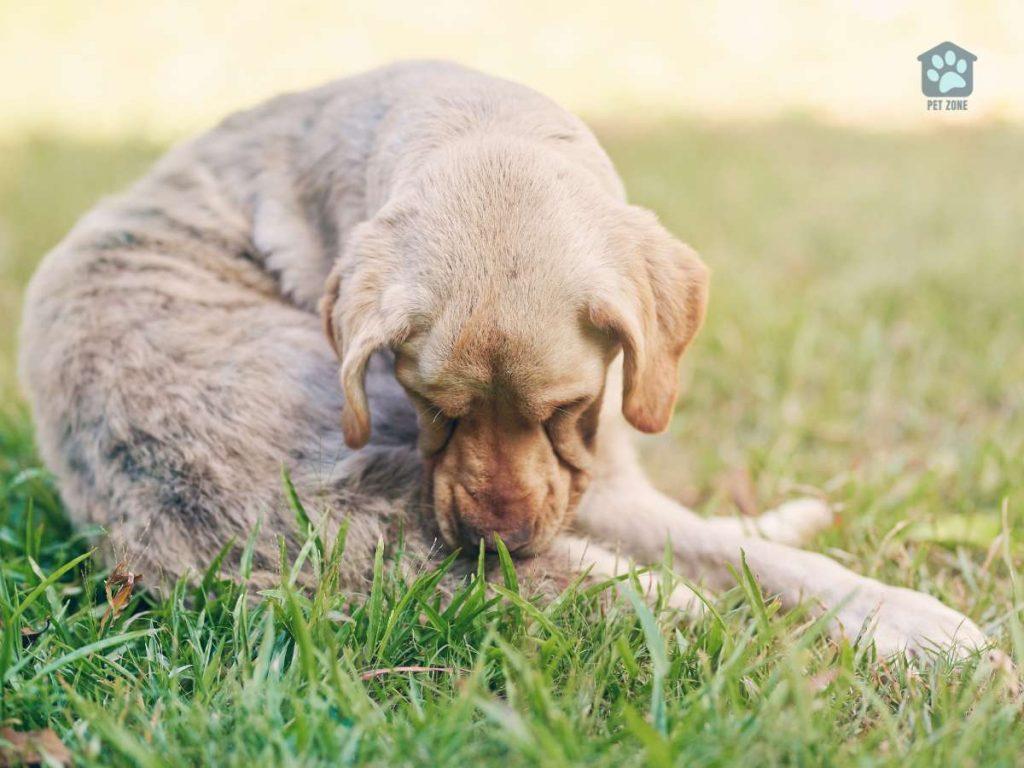
Conclusion: Taking Care of Your Dog’s Needs
Understanding why your dog may chew their leg until it bleeds is more than just a mystery to solve; it’s about companionship, care, and responsibility. From itchiness caused by allergies to certain environmental triggers, anxiety, or other underlying medical conditions, the reasons why dogs chew their paws can be diverse and complex.
Consulting a vet and following a comprehensive treatment plan is vital. By taking these steps, dog owners can address the root causes and provide the necessary relief to their furry friends. Engaging your pet with chew toys, ensuring adequate stimulation, maintaining cleanliness, and adjusting diets as needed all contribute to a happier and healthier life for your dog.
Chewing doesn’t have to be a chronic problem. With the right knowledge and commitment, you can stop your dog’s excessive chewing and foster a loving, safe environment for them. Remember, your dog’s well-being is in your hands, and taking the time to notice, understand, and address these issues demonstrates a genuine love and care that goes beyond mere ownership.
Feel free to share your experiences or thoughts in the comments below, and don’t hesitate to share this article with fellow dog owners who might benefit from these insights. Your participation helps us build a community that supports responsible pet care and companionship.
As an Amazon Associate I earn from qualifying purchases.
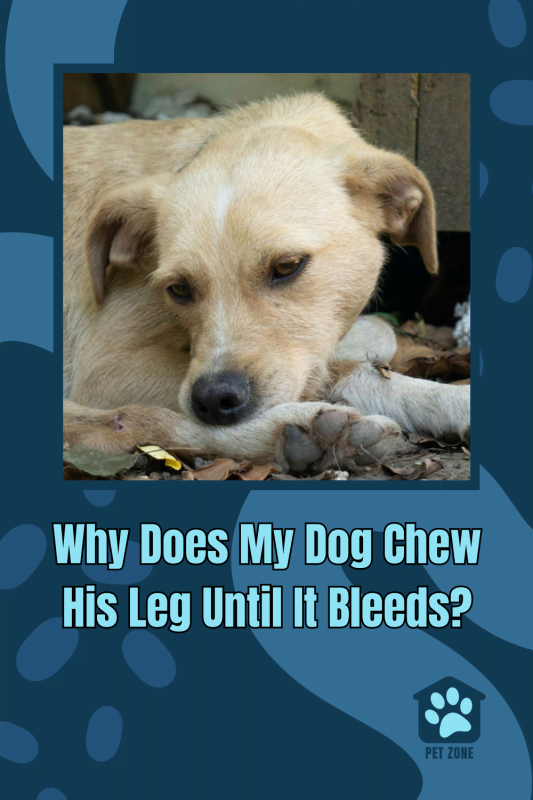


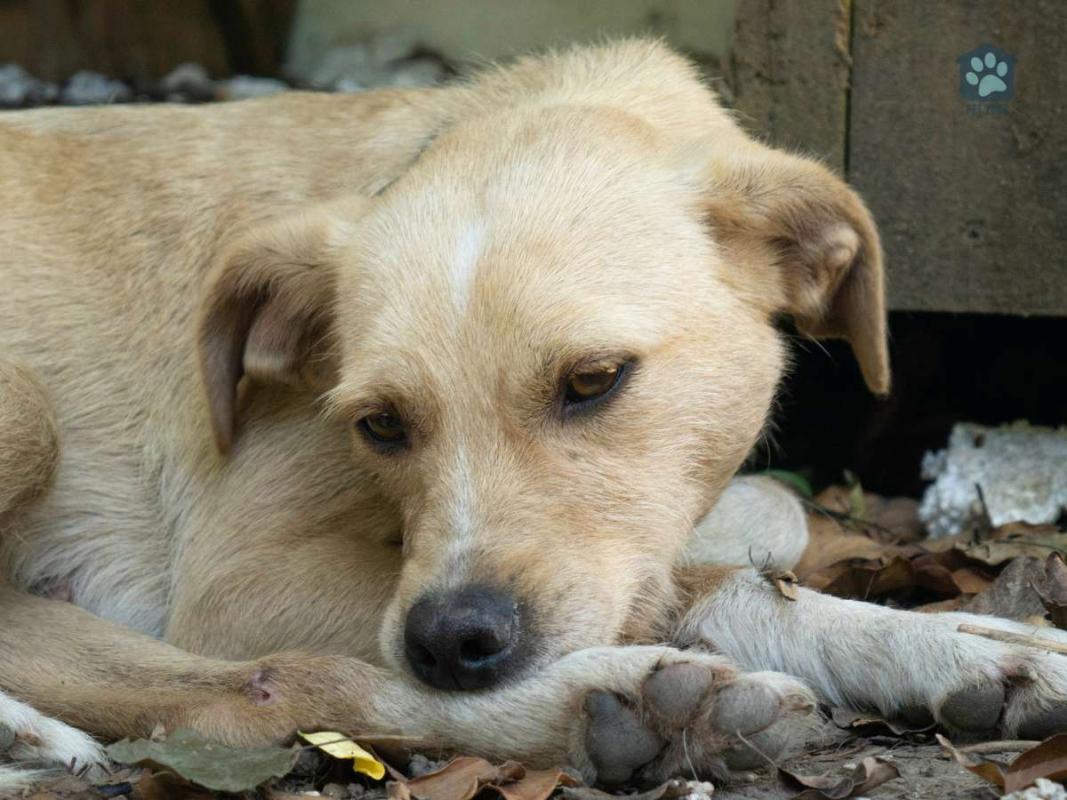



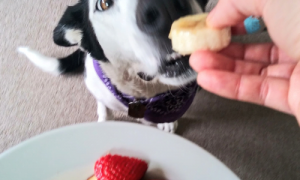
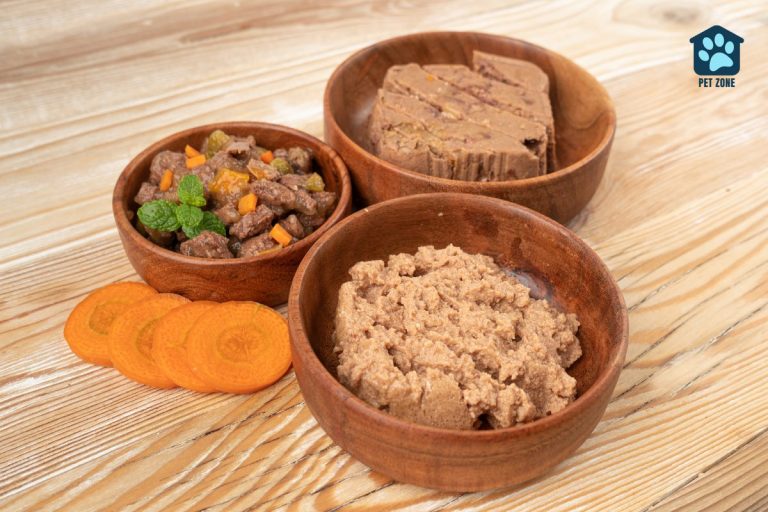
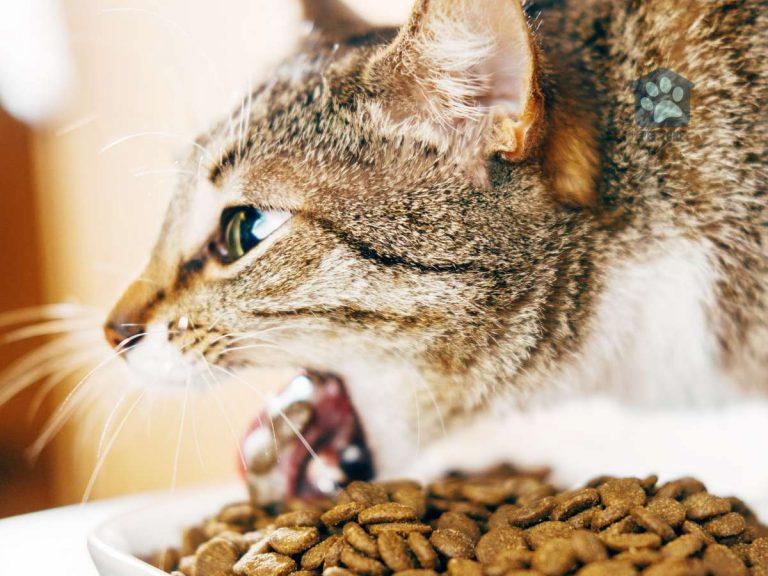
Very helpful insight into why pups chew their leg. My girl will lick her leg – so I always know something is up with her.
We usually use frozen kongs for our dog. It does help with him chewing on himself, but it also helps with his teeth.